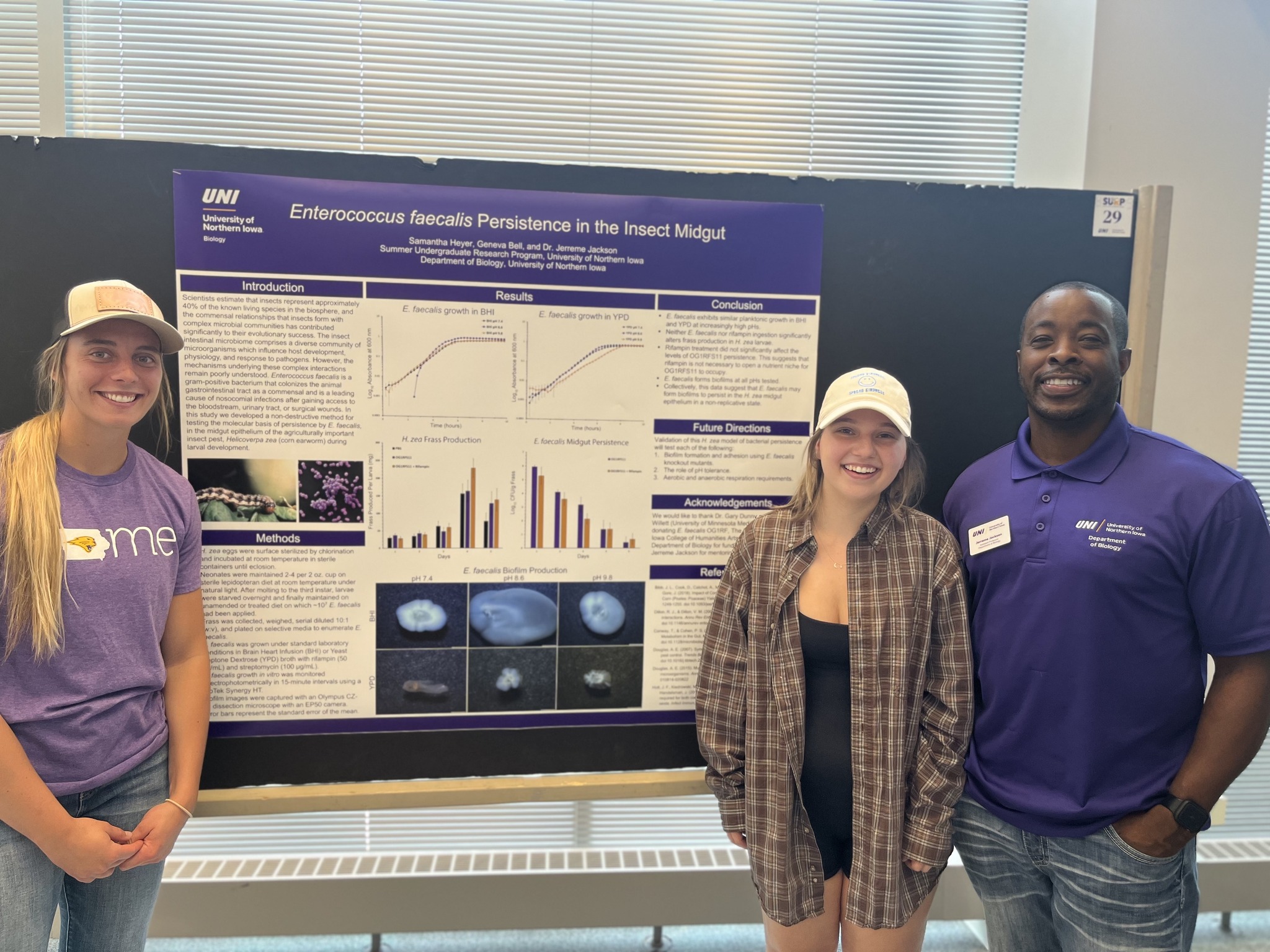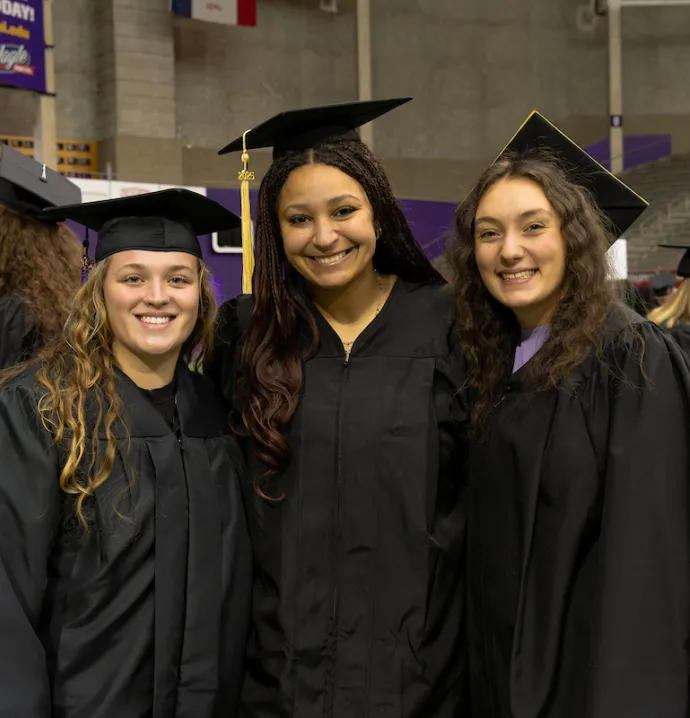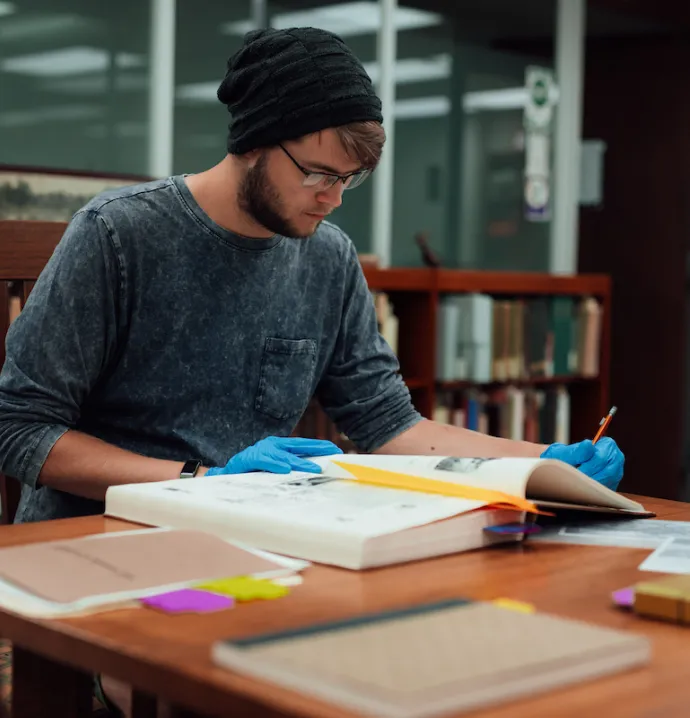Undergrad biology research published in academic journal
Undergrad biology research published in academic journal

Geneva Bell and Samantha Heyer took two different routes to UNI and have unique goals for their future, but their paths converged in the lab of Assistant Professor Jerreme Jackson. The results of their research relating to pesticide development and medical treatments have been published in the academic journal “Frontiers in Microbiology” before either of the students have earned a bachelor’s degree.
UNI students have the opportunity to work closely with professors due to UNI’s smaller class sizes and emphasis on hands-on learning.
“I didn't really know doing research as an undergraduate was an option until I did it,” said Heyer, a senior majoring in biology and gerontology with a chemistry minor who is also an All-American pitcher on UNI’s softball team. She hopes to become a physician assistant some day. “It was quite intimidating at first, and I was a little hesitant. But Dr. Jackson encouraged me, I went through with it and I don't regret it.”
“A lot of the time what happens is people will go into research, and during their master's or pre-PhD program, they decide they hate research because they had never done it before,” explained Bell, a senior majoring in biology, biochemistry and Spanish. While she’s always loved science, she’s grateful that she was able to discover her passion for research as an undergraduate, and now hopes to become a full-time researcher.
During their time with Jackson, Heyer and Bell researched Enterococcus faecalis, a bacteria that is commonly found in the gastrointestinal tract of mammals and insects. Specifically, they studied the bacteria in the larvae of the corn earworm. The purpose was twofold. Firstly, they wanted to investigate possible treatments for people who are infected with this bacteria. Secondly, they hope their research can help with pesticide development, since the corn earworm is a common pest to corn and soybeans in Iowa.
Bell, a transfer student who is originally from Lake Zurich, Illinois, knew Jackson because she was a teaching assistant for one of his classes. After she applied for summer research, Jackson reached out to her directly and asked if she wanted to start the research immediately. Bell jumped at the chance.
“I tell everyone that I talk to that going to UNI was one of the best decisions I ever made because there are so many opportunities I’m grateful for that I wouldn’t have gotten elsewhere,” she said.
“I tell everyone that I talk to that going to UNI was one of the best decisions I ever made because there are so many opportunities I’m grateful for that I wouldn’t have gotten elsewhere,” said Bell.
If she went to a larger school, Bell believes she may not have formed the relationship with Jackson that led to research opportunities. In addition to guiding her through the research process, Jackson helped Bell understand her career options. He wrote her recommendation letters and helped with internship applications.
“Once I found out she was interested in research and pursuing doctoral studies, I invited her to check out our lab, and she's been involved ever since,” said Jackson. “She's a jack of all trades.”
Bell has one semester left at UNI. During the summer, she has an internship in South Carolina that will involve more research. Because she already has a publication to her name, Jackson has suggested she aim high for master’s programs. It’s given her an extra boost of confidence before she takes the next step in her career.
While Heyer may not have always seen herself conducting research, Jackson was thinking about it long before their first day in the lab together.
“Before Samantha ever took an interest in research in my lab, I knew she'd be good at it,” said Jackson. “One day, she stopped by my office to ask about research in the lab. I knew it was going to lead to something big.”
Heyer loves the way research has truly brought science to life for her. When she is working in health care, she will have a better understanding of what scientists go through before publishing a research paper.
“What I love about research is I learn a lot of the coursework during class, but with research, you get to apply it and gain a greater understanding with what I’m looking at,” she said. “You're not just memorizing something to get an A. You’re critically thinking about something and trying to figure it out.”
Being in the lab has also taught her some important lessons.
“Having a mentor like Dr. Jackson and a lab partner like Geneva really set us up for success,” said Heyer. “We got to attack problems together, because there were a lot of failures throughout the research. You can apply that to life - it's not always gonna go perfectly the first time you try it. You have to learn to accept that failure and tweak, adapt and go forward.”
You can read more about the findings of Jackson, Heyer and Bell’s research online.




